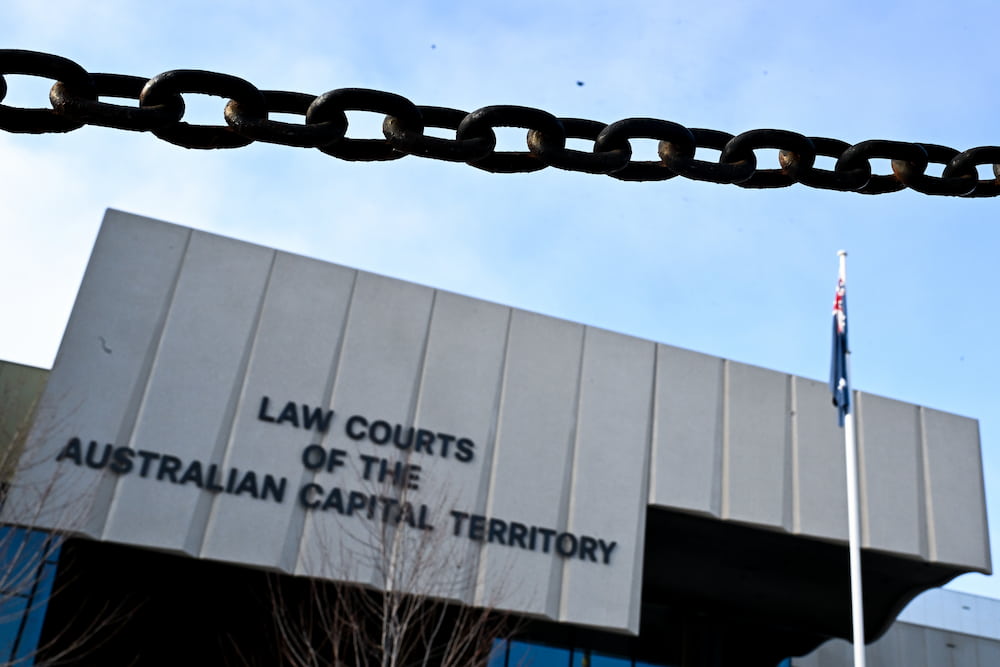Labor MLA Dr Marisa Paterson and community organisations are calling for the ACT Government to establish a specialist sexual offences court.
In an open letter to Chief Minister Andrew Barr, Dr Paterson and advocates said the ACT needed a court system that provided a safe environment; that ensured “victim-survivors of sexual violence” were prepared, knew what to expect, and could make informed choices; and that they were supported by trained legal experts and judiciary who are educated about sexual violence, trauma-informed court services, and the impact of crimes on ‘victim-survivors’.
Currently, the letter states, nearly 90 per cent of women do not report sexual assault to the police, and less than 10 per cent of reports result in convictions. Moreover, the court system is an “overwhelmingly negative experience” for ‘victim-survivors’, who “are often retraumatised through the process”.
“Our system is failing victim-survivors…” Dr Paterson said. “For those victims that do seek to pursue justice through the criminal system, we need to provide a system that does not exacerbate trauma, disempowerment, and entrench violence against women, rather, present a system where justice can be fairly sought.”
A specialist court to fast track and prioritise all sexual violence matters, as NSW had set up, and two Supreme Court specialist judges in sexual assault matters were recommended by the Listen. Take Action to Prevent, Believe and Heal Report, which the Sexual Assault Prevention and Response Steering Committee produced in 2021. The ACT Government agreed to consider introducing a specialist court for sexual offences and a similar court program for victim survivors of sexual violence in the ACT.
New Zealand, South Africa, and Scotland have successfully trialled or established specialist sexual offences courts, Dr Paterson noted.
The letter also builds on recommendations of the Sofronoff Board of Inquiry report.
The letter was signed by the Canberra Rape Crisis Centre; the Domestic Violence Crisis Centre; A Gender Agenda; the YWCA; the Aboriginal and Torres Strait Islander Elected Body; and Women with Disabilities ACT.
“This should not be controversial,” YWCA Canberra CEO Frances Crimmins said. “The Listen. Take Action to Prevent, Believe and Heal Report – which YWCA Canberra contributed to as a member of the Prevention Working Group – found that faith in the justice system among survivors was poor. Delays in proceedings meant the lives of many were effectively put on hold for years. Significantly, the Report recommended that steps be taken to investigate a specialist court for survivors of sexual violence that will fast-track their matters. This is a call for the ACT Government to follow through on that recommendation.”
The letter states: “Sexual violence remains one of the most under-reported, under-prosecuted and under-convicted crimes in the ACT and nationwide. Victim-survivors of these crimes often report that they experience significant challenges in reporting sexual offences to the police and are often revictimised through court processes.”
According to ABS data, the letter observes, 42 per cent of women over the age of 15 in the ACT (73,200 people) have experienced physical (31 per cent) or sexual (25 per cent) violence.
(The letter, however, does not mention that Australian men are more likely to experience violence of any sort than women: 43 per cent of men experienced violence, compared to 39 per cent of women. Women nationally were nearly four times more likely to experience sexual violence: 22 per cent of women, compared to 6.1 per cent of men. But 42 per cent of men experienced physical violence, while less than one-third (31 per cent) of women did.)
Of those women who experienced sexual violence in the ACT, the letter remarks, 87 per cent did not report the offence to the police. While 500 sexual offences were reported to the police in the ACT in 2021–22, very few cases progressed to the court, and of those that did, only 7 per cent resulted in a conviction.
“There is a clear disconnect between the prevalence of sexual violence in our community and interaction of victim-survivors with the criminal justice system,” the letter states. “Victim-survivors’ ability to achieve justice through the current justice system in the ACT is deeply concerning.”
Indigenous people, people with diverse gender and sexual identities, and people with disabilities may be disproportionately affected by sexual violence, the letter argues. Gender diverse people reported experiencing sexual violence or coercion four times as much as the general population (53.2 per cent to 13.3 per cent), according to the 2018 Trans and Gender Diverse Sexual Health Study. Nearly half of adults with a disability (47 per cent) experienced violence, compared to a third (36 per cent) of people without disability, according to the Australian Institute for Health and Wellness. Three times as many Indigenous women reported sexual violence than non-Indigenous women, according to Our Watch.
“The ACT criminal justice system is not currently equipped to respond and support such diversity of needs and experience,” the letter states.
Dr Paterson believes that re-education is also necessary. “A specialist court is not the sole answer to addressing this violence in our community,” she said. “For that, there needs to be whole-of-community education driving cultural and attitudinal change.”
The ACT Government was asked for comment.



